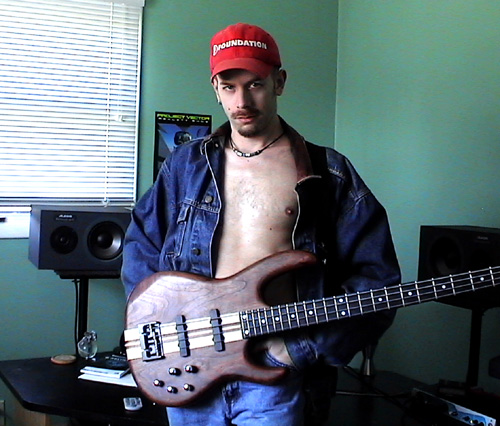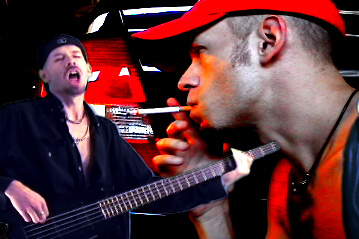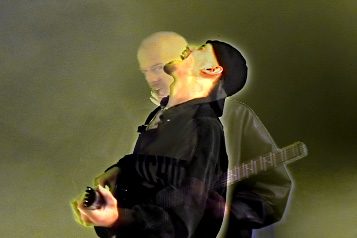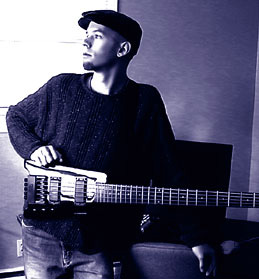MAY 2006 Featured Player of the Month
bassist-songwriter David Vector
Interview by Robert Urban for GAY GUITARISTS WORLDWIDE

Like many musicians, David Vector began his life in music with piano lessons at the age of ten. His obsession with rock music developed almost overnight at fifteen when he discovered Rush and Yes, and the piano lessons fell by the wayside as he took up synthesizers and bass guitar.
David played in various cover bands during and after high school, but none of them progressed to the point of recording original material. Finally, David decided to record an album on his own. The result was a disappointment and was never released. He tried again two years later and, once again, the finished product fell short.
At that point, David hit a major crisis that had been coming on for years. Heíd known deep down that he was gay all along, but had chosen not to deal with it; it was time to deal. Music was placed on the sidelines for a while as he explored his sexuality and learned, at last, to be himself.
Emboldened by his newfound honesty and a supportive circle of friends, he finally released his debut CD, Immovable Mover, in 2003. The album received some favorable attention in the progressive rock community, but David realized that it represented his past, not the person he had become. Intrigued by the techno music heíd been hearing in gay clubs, he wanted to do something more modern and daring. His experiments solidified into his 2005 release, Reality Show, which found him fusing his progressive rock past with a more cutting-edge sound and writing gay-themed lyrics for the first time. Reality Show introduced him at last to the GLBT community and has received airplay on numerous GLBT radio programs since its release.

- What brand/model/year instrument(s) do you record and play out with?
Iíve tried a few different basses, but I havenít found anything that feels as comfortable in my hands or sits in the mix quite as nicely as my 1999 Carvin LB-70. I had it made out of walnut in a Tung oil finish and the really thin, uncoated neck on that bass feels fantastic; I wonít ever go back to a bass with a polyurethane-coated neck.
- What brand/model/year amps & effects (if any) do you use?
For recording, Iíve just been running my bass straight into the A/D converters on my computer system and doing all processing with software plugins. When it comes time to start gigging again (hopefully later this year), Iíll probably just get an amp simulator/effects unit for the bass and run direct. Iíd prefer not to have any amp cabinets onstage in order to keep stage volume at a minimum and get a tight, focused live sound.
- Any special/favorite instrument tones/effects/approaches/techniques you've used/discovered in recording and/or performance that you really like?
When recording and mixing my bass, I have my own ďstandardĒ settings on the Waves Renaissance EQ and Compressor plug-ins that I start with, but I do try different things. Sometimes Iíll also add a little stereo chorusing with Waves Doubler, and I often run through the IK Amplitube plug-in, depending on the song. Iíll favor the bridge pickup on the Carvin if I want that more twangy Ď80s Geddy Lee type sound, or blend the pickups more equally if I want a warmer, rounder tone.
- Who are your main influences as an instrumentalist? Which artists? Which bands? Instrumentalist? Which artists/bands were your favorites in your youth?Rush were pretty much everything to me in my early formative years. It was a Keyboard Magazine interview with Geddy Lee that first sparked my interest in rock music when I was fifteen, and I ended up becoming so engrossed in his style of playing and arranging songs that his influence has become permanently ingrained in what I do. I was also pretty big on Yes (during the Trevor Rabin era) and very impressed by the bass playing of Tony Franklin, Tony Levin, and Patrick OíHearn.
In the non-bass realm, I became a fan of William Orbit as soon as I heard his work on Madonnaís ďFrozenĒ and ďRay of LightĒ on the radio. He had a lot to do with my eventual desire to delve into techno/electronica. But my version of techno still has a bit of the prog rock approach in the stylistic mix, and I incorporate my rather hyperactive bass guitar playing into it, instead of just using the kind of simple, static synth bass lines you hear in most techno music.
- Tell fans about your luv for your particular style of music, as opposed to other styles - how it became your favorite style of rock, etc
At this point, I donít necessarily have any one specific style thatís really ďitĒ for me. Iím kind of an anti-purist in that regard; Iím mostly interested in trying to forge these ďhybridsĒ of existing styles ≠ blending bits of prog rock, techno, industrial, world music, funk, or whatever ≠ to create something thatís at least slightly different from anything else thatís out there. Starting with my last CD, Reality Show, that fusing of styles that might at first seem incompatible has kind of come to define my musical personality.
- Do you play/compose/record only your own original music? Do you do any other work in music - e.g. teaching, recording session work, hired gun, producing, etc? Does your playing appear on recordings of any other artists?
Thus far, Iíve only appeared on my own solo releases, which have pretty much been the full extent of my musical activities for a while. I havenít played in cover bands for years. When I do start gigging again in support of my solo releases, Iíll be throwing in some covers that are suitable for the venues. Who knows, I might just perplex everybody with a techno/dance version of a Rush song!
- Is there a particular favorite solo or part you played on a recording, or a certain piece of composed music you wrote, that you feel represents your finest work?
I think the songs Iím recording now for my next album represent my most cohesive and individualistic work thus far. Iím still proud of Reality Show, but I think I was trying to adapt myself to a fairly radical stylistic shift on that CD and some of the experiments hadnít quite solidified yet. Iím working on a song right now on which Iím layering three tracks of bass guitar, one track holding down the low end and two tracks of chordal parts; itís something I havenít really done before to that extent, and itís cool using bass to fill in areas that would usually be played on guitar or synths. I think Iím learning to ďgrooveĒ a little bit more on this album too ≠ there are actually traces of funk creeping in here and there.

Any special thoughts on your instrument, and what it's meant to you in your life?
Iíd have to say that making music has given me a purpose above and beyond just going to work and paying the bills that many people who havenít been gripped by that kind of obsession will never know. I have to do creative work. Iíve never been the kind of guy who could be satisfied with an ďordinaryĒ life. But it can be as much of a curse as a blessing. As the saying goes, ďThe artist is plagued by self doubt and tormented by anxiety.Ē Not to mention very limited cash flow sometimes!
Can you relate any special feelings or experiences about being a glbt player in the mostly straight music world... especially regarding your formative/learning years on your instrument?
When I was starting out and playing in my first cover bands, I was totally closeted and hadnít yet breathed a word of my sexual orientation to anyone. A few times I had band mates make semi-joking jibes about ďbatting for the other teamĒ because I never showed any interest in any of the girls in the clubs where we played, but it never amounted to much. I had feelings of resentment at times, because they were able to be so openly themselves, and I felt at the time that I would always be hiding. But the last time I played in a cover band, about five years ago, they knew I was gay. It felt so liberating to be in a band with these straight guys, and to have them know I was gay and be cool about it.
Now that Iím an openly gay solo artist putting out my own CDs, I sometimes find myself with mixed feelings. On the one hand, I want to be open about who I am and I donít hesitate to write gay-themed lyrics when inspired to do so. On the other side of the coin, though, I donít want my ďgaynessĒ being pushed out front as a PR gimmick to the point that people become more preoccupied with that than with the music. I donít feel the need to broadcast my sexual orientation at full volume with every sentence I utter or every song I write ≠ itís an important part of me, to be sure, but itís not everything. Whether youíre a gay, bi or straight artist, there are things other than oneís sexuality to talk about and write songs about.
- For a glbt player - how does the overall music scene differ today
from years ago?
I think itís definitely a better climate in which to be an ďoutĒ artist. Twenty years ago, GLBT artists like Melissa Etheridge had to keep their sexuality in the background and wait until they were already firmly established to come out. Now, you have bands like Scissor Sisters with members who are openly gay from the word ďgoĒ who can still achieve worldwide success. Via the Internet, we now have better ways of getting the word out to GLBT audiences as well, so those of us writing gay-themed songs can actually get them heard by those who will most appreciate them. Mind you, itís good to get those gay-themed songs heard by straight listeners too. People who tune out of speeches and heated editorials can sometimes be reached more subtly and effectively by a song. Some of the most positive responses I received from ďRyanís Last Drive,Ē a song about gay teen suicide from my last CD, came from straight male listeners who said that it gave them a sense of how hard it must be to grow up gay.
- Any advice for young glbt players?
I guess my only advice is the very general urging to just be who you are. I didnít do that for many years and my music and life in general suffered greatly for it. I canít help but wonder how much further along I might now be on the path to my goals if I hadnít let that ďterrible secretĒ I was holding onto make me afraid to go out into the world and go after what I wanted.
- What are your current and future musical projects?
Right now, Iím recording a new CD, which I hope to have finished by Summer or early Fall 2006. After that, Iím going to start putting a live show together to go out and gig in support of the new album. After getting my feet wet doing a video for ďOut of the ClosetĒ from my last album, I also plan to shoot some videos for songs from the new disc.
More on DAVID VECTOR: WWW.DAVIDVECTOR.COM
Read more GGW's "GUITARIST OF THE MONTH" Interviews
Go to Robert Urban's Music & Arts Reviews
Return to Robert Urban Homepage